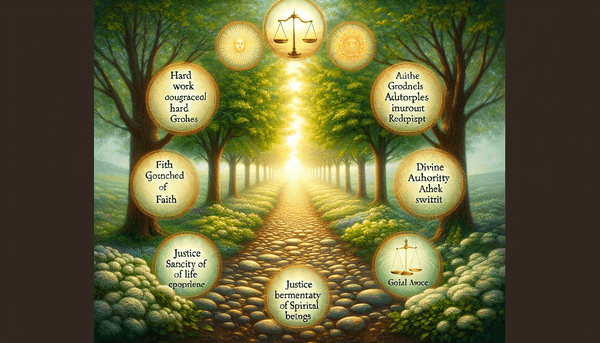Healing with a Partner
In the dance of partnership, healing plays a pivotal role, where each step is taken in tandem with support, understanding, and empathy. The Bible encapsulates this notion in Ecclesiastes 4:9-10, emphasizing that 'Two are better than one because they have a good return for their labor. For if either of them falls, the one will lift up his companion.' Healing with a partner means creating an environment of safety and openness, where feelings and concerns can be shared without fear of judgment. This can be instrumental in overcoming obstacles together. Professional help and guidance can also play a significant role in this process, serving as a lighthouse guiding ships through stormy waters. As we embrace love and compassion, we become both the healer and the healed within the sanctuary of our relationships.
Overcoming Jealousy in Relationships
Jealousy, a tempestuous emotion, can threaten to capsize the boat of a loving relationship if not navigated with care. The Apostle Paul provides a beacon of hope, advising in 1 Corinthians 13:4 that 'Love is patient, love is kind. It does not envy, it does not boast, it is not proud.' To overcome jealousy, it is essential to lay the keel of trust and engage in open communication. Reflecting on the roots of jealousy and discussing these feelings can help calm the turbulent seas. Cultivating your own friendships and interests provides a balanced and fulfilling life, which, in turn, can strengthen the bonds of your partnership. Remember, fostering trust and mutual respect is the compass that guides you to a secure and loving relationship.
Practicing Patience with Your Partner
Patience is the silent whisper of love, a virtue that weaves through the fabric of enduring relationships. It is the soft-spoken assurance in the verse from 1 Corinthians 13:4-5, reminding us that 'Love is patient, love is kind...It is not easily angered, it keeps no record of wrongs.' In moments of doubt, when you question whether you are patient enough, engage in heartfelt communication with your partner. Listen to their perspective and reflect on your actions. This reflection and understanding are the cornerstones of patience. Like any skill worth mastering, patience requires practice and effort. Embrace humility and seek guidance to navigate through these challenges, and you will find the patience you seek growing within your heart.
Expressing Discomfort and Setting Boundaries
Expressing discomfort in a relationship requires a delicate balance between honesty and respect. The Bible teaches us to look beyond our own interests and also consider those of others, as highlighted in Philippians 2:4. Communication is key when addressing issues that affect our well-being, and it is crucial to approach these conversations with empathy and a desire for mutual understanding. Setting boundaries is an act of self-care that, when communicated effectively, can foster a stronger, more respectful relationship. As we navigate these conversations, let us be guided by the principles of love and respect, ensuring that our voices are heard while honoring the bond we share with our partners.
FAQ
Q: How can I heal with a partner?
A: Healing with a partner involves mutual support, understanding, and empathy. It's important to create a safe and open environment where both partners can express their feelings and concerns. Additionally, seeking professional help and guidance when needed can also contribute to the healing journey.
Q: How can I not be jealous of my partner's friends?
A: To mitigate feelings of jealousy, trust and open communication are crucial. Reflect on why you feel jealous and discuss these feelings with your partner. Nurturing your own friendships and interests can also help you feel more secure and less jealous.
Q: How can I practice patience with my partner?
A: Patience can be cultivated by having open and honest conversations with your partner about your feelings. Listening to their perspective and reflecting on your actions can foster understanding and patience. Remember that patience is a virtue that requires practice and effort.
Q: How can I express my discomfort to my partner without hurting the relationship?
A: Open and honest communication is essential in a healthy relationship. Express your discomfort with empathy and seek to understand each other's perspectives. Setting boundaries with respect can lead to a stronger and more respectful partnership.






